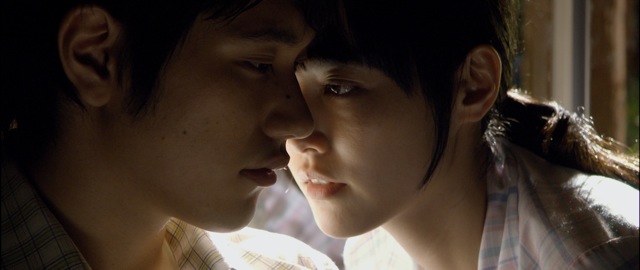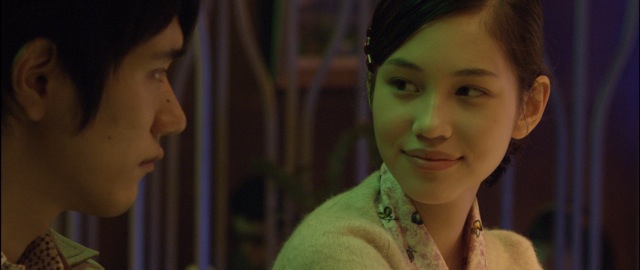CHICAGO – Patrick McDonald of HollywoodChicago.com appears on “The Morning Mess” with Dan Baker on WBGR-FM (Monroe, Wisconsin) on March 21st, 2024, reviewing the new streaming series “Manhunt” – based on the bestseller by James L. Swanson – currently streaming on Apple TV+.
‘Norwegian Wood’ Marred By Choppy Editing, Mopey Melodrama
 Rating: 2.5/5.0 |
CHICAGO – Tran Anh Hung’s adaptation of Haruki Murakami’s 1987 novel has garnered a bevy of negative reactions from literary fans, and it’s easy to see why. Pivotal characters remain underdeveloped despite the film’s two-hour-plus running time. Grand gestures are made without any tangible motivation. And epic romances are explored only through a few lustful glances.
With that being said, “Norwegian Wood” is still worth a look, primarily because the attractive young cast manages to transcend the heavy-handed script. Kenichi Matsuyama is somewhat of a wooden leading man, but he’s greatly aided by two leading ladies that bring out the best in him. “Babel” star Rinko Kikuchi once again delves into the wounded soul of a woman who’s lost the ability to connect with the outside world, while 21-year-old newcomer Kiko Mizuhara proves to be a real find.
Together, these three fresh-faced performers create a handful of beautifully raw and infectiously sensual moments that nearly make up for the plot’s gaping chasms. There are times when the editing is so spotty (particularly during the first third) that it seems as if large sections of the film were extracted altogether. Kenneth Lonergan’s similarly fractured “Margaret” suffered staggering cuts, yet they ended up strangely enhancing the film’s portrayal of its adolescent heroine’s confused psyche and volatile mood swings. “Norwegian Wood” also centers on hormonal teens adrift in society, but the fragmented pacing appears to be more a result of narrative clumsiness. Whenever the film doesn’t have the time to adequately tackle the entirety of a subplot, Matsuyama is required to recite banal exposition in jarring voice-overs. It suggests that the film should’ve run at least three hours, but the story is such a simple one to tell. The real problem may lie in the writer/director’s inability to cut extraneous story threads in favor of fully concentrating on his three principles. Without understanding the characters’ past, it’s difficult to emotionally invest in the picture’s central love story.

Kenichi Matsuyama and Rinko Kikuchi star in Tran Anh Hung’s Norwegian Wood.
Photo credit: Red Flag Releasing
Set against the tumultuous political climate of 1960s Tokyo, where fiery protest marches amount to little more than window dressing, 19-year-old introvert Wantanabe (Matsuyama) strolls the streets with a sullen grimace. Wracked with despair after the suicide of his best friend, Kizuki (Kengo Kora), Wantanabe finds himself drawn into the embrace of his buddy’s ex-girlfriend, Naoko (Kikuchi), who floats through the film like a ghost. Her devastation over Kizuki’s death has resulted in a directionless existence, and Wantanabe attempts to stifle her cries with his lips, and eventually, with other parts of his anatomy. This is the first of multiple scenarios in the film where sudden tragedy immediately leads to lovemaking. By the last act, this progression starts to feel like an unintentional running gag. There’s a coupling toward the end that makes absolutely no sense within the context of the script, yet the initial love scene between Wantanabe and Naoko is powerfully acted by Matsuyama and Kikuchi. Cinematographer Ping Bin Lee (“In the Mood for Love”) shoots with an HD lens that brings an earthy texture to his ravishing imagery. Like Kieslowski, Lee prefers to focus on the characters’ expressions rather than their nudity during a sex scene, and in this particular case, he captures every nuance of pleasure, pain and guilt on Kikuchi’s enormously expressive face.
When Naoko flees to live in a sanatorium near Kyoto, Wantanabe becomes torn between caring for her and entertaining the advances of a vivacious chatterbox, Midori (Mizuhara). There’s a seductive monologue where she describes precisely what she would like Wantanabe to do with her, and the scene has an erotic impact identical to that of the earlier lovemaking scene. Both of these moments also greatly benefit from the lack of a score. Composer Jonny Greenwood’s atonal riffs have been superbly effective in the operatic dramas “There Will Be Blood” and “We Need to Talk About Kevin,” but his music in “Norwegian Wood” is intrusive every time it attempts to pump up the overwrought melodrama. Though Hung claims that he was aiming for realism, he often resorts to impressionistic clichés, such as when a sad love scene is accompanied by blue-tinted precipitation framed through a nearby window. What’s most maddening about the plot itself is its insultingly weak female characters, who seem all too eager to off themselves whenever a man falls out of their lives. Only Midori stays strong throughout, yet Hung sees her more as a singular life force than a three-dimensional being.

Kenichi Matsuyama and Kiko Mizuhara star in Tran Anh Hung’s Norwegian Wood.
Photo credit: Red Flag Releasing
Perhaps the one thing Hung did right in his adaptation was refuse to view the story through the gauzy glare of nostalgia, opting instead for a present tense narrative that digs directly into the angst of its restless youth. Mizuhara’s performance is the main reason to seek out the film. Her mischievous spirit and stubborn desire to seek out happiness in even the direst of circumstances is a joy to behold. If Hung put more effort into developing her character, he would’ve had something truly special. But even as the story falters, Lee captures vivid imagery that is well worth savoring, such as a dizzying race up flights of stairs or a hypnotic walk through a field. Even if the film falls far short of being a masterpiece, it certainly looks like one.
One final thought: why is Hung’s film and Murakami’s book named after the infamous Beatles tune? The song’s themes of elusive love are reflected in the narrative, I suppose, but I’d argue that it could’ve just as easily been titled “Eleanor Rigby,” “All You Need is Love” or “I Want You (She’s So Heavy).”
 | By MATT FAGERHOLM |


